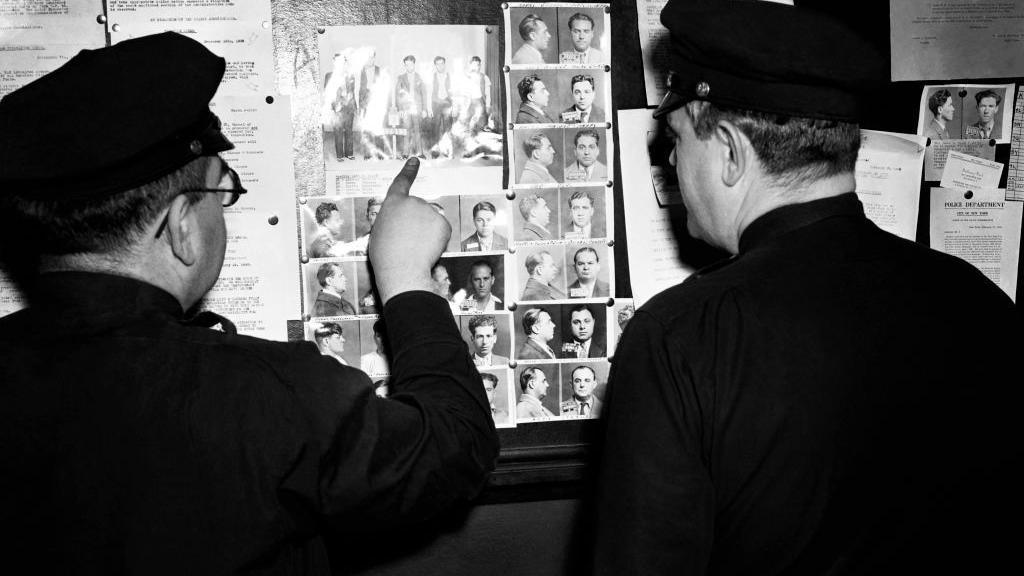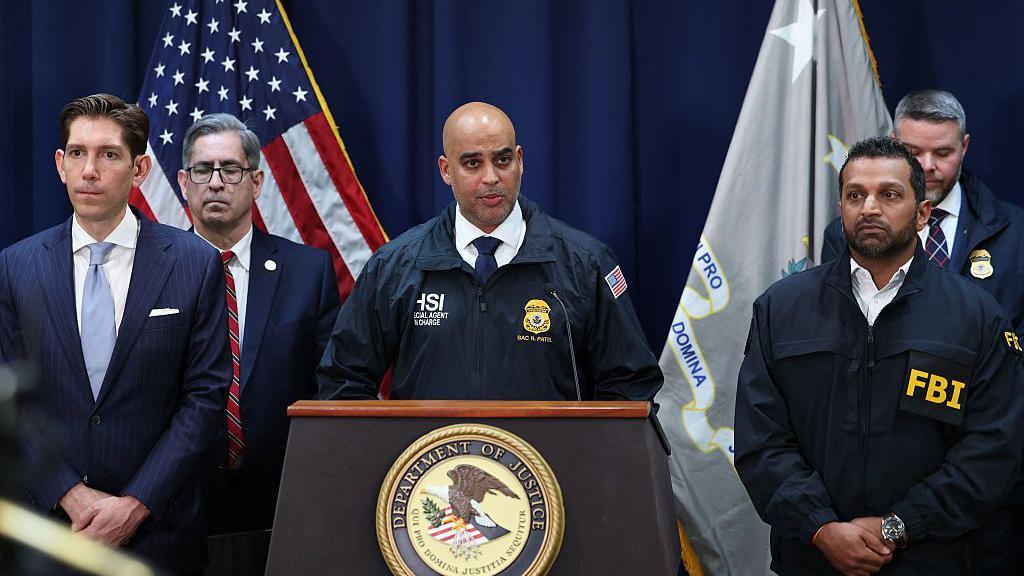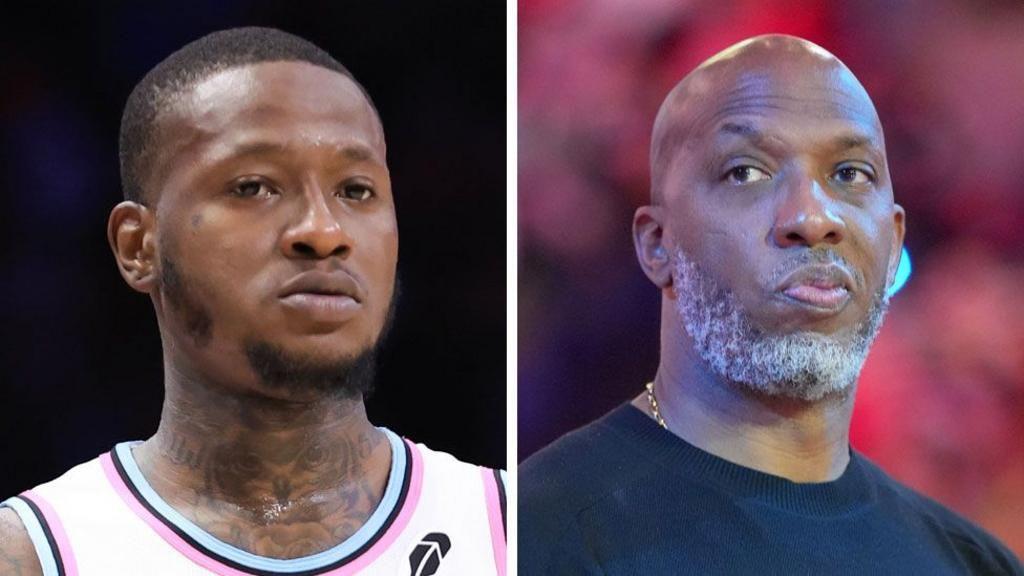'The mafia ain't what it used to be' - FBI's gambling case shows mob's evolution

- Published
When US officials unveiled two staggering illegal sports betting investigations on Thursday, they described the operations as something "reminiscent of a Hollywood movie".
One of the schemes, which allegedly involved NBA figures, specialised contact lenses, marked cards, an x-ray table and $7m (£5.2m) in losses, led to the arrest of 31 people across 11 states, including members of the American-Sicilian mafia operation La Cosa Nostra.
Part of what makes the case feel so cinematic is the alleged involvement of the mob. Thanks to decades of film, television, and books dedicated to tales of mafia exploits, the mafia has developed a mythical place in American culture.
"As Ray Liotta said in Goodfellas: 'We were treated like movie stars with muscle'," said attorney Edward McDonald, who, as the real-life prosecutor who managed former mobster-turned-FBI informant Henry Hill, played himself in the iconic film.
But former prosecutors said the mafia's influence and activities have changed since its heyday in the 20th century, when blood-soaked tabloid covers bearing news of mafia hits, business shakedowns, and blockbuster trials were the norm.
Aggressive prosecutions in the 1980s and 1990s helped break the power of the mafia in New York and took down several prominent leaders.
"The bottom line is, the mafia ain't what it used to be," Mr McDonald said.
In fact, it has evolved. And the poker-fixing investigation announced by the FBI on Thursday provides a fair representation of what those activities look like in the 2020s, former prosecutors say.
"These families continued to exist and shifted to rackets that were a lot more profitable and had a lot fewer downside risks to them, in terms of years of prison they might face," said Drew Rolle, the former acting chief of the organised crimes and gangs section at the Eastern District of New York.
The mafia now involves itself in securities fraud, gambling, online sports betting, and so called "boiler-room" operations that involve elaborate telephone scams, he added.

Special agent Ricky Patel told reporters the investigative work that culminated in this operation was "reminiscent of a Hollywood movie"
In 2022, federal authorities in the Eastern District indicted nine members of the Genovese and Bonnano crime families on charges of racketeering, illegal gambling, money laundering, and other crimes.
In December 2024, former Genovese crime family captain Carmelo Polito was sentenced to 30 months in prison for running an illicit gambling parlour and illegal online gambling scheme.
Thursday's indictment added yet another example to the pile.
Federal law enforcement laid out an elaborate scheme in which the defendants "used sophisticated technology and enlisted current and former NBA players to cheat people out of millions of dollars".
Three of the so-called Five Families – the Gambinos, Bonnanos, and Genoveses – were allegedly involved.
"When people refused to pay because they were cheated, these defendants did what organised crime has always done: they used threats, intimidation, and violence," New York City Police Commissioner Jessica Tisch said.
Beginning as early as 2019, the criminal enterprises set up illegal poker games that utilised a range of cheating technologies, the indictment states.
The defendants used a compromised shuffling machines to rig the decks, and a "chip tray analyser" that secretly reads cards using hidden cameras.
In a detail more reminiscent of Mission Impossible than Miller's Crossing, players are accused of wearing special contact lenses or eyeglasses that helped them see pre-marked cards.
Former professional NBA athletes were enlisted as so called "Face Cards" to entice unsuspecting players to join the game, according to prosecutors.
Portland Trail Blazers head coach Chauncey Billups and former NBA player Damon Jones allegedly participated in the plan.
The illegally obtained information was transmitted back to an off-site participant who then sent details back to a co-conspirator sitting at the poker table, prosecutors allege. The players participating on the scheme would signal each other as the game progressed.
Mr Billups' attorney, Chris Heywood, said in statement that his client "has never and would never gamble on basketball games, provide insider information, or sacrifice the trust of his team and the League, as it would tarnish the game he has devoted his entire life to."
The NBA announced it had placed Mr Billups on "immediate leave" from his coaching position.
"We take these allegations with the utmost seriousness, and the integrity of our game remains our top priority," it said.
Federal authorities also arrested NBA player Terry Rozier of the Miami Heat over charges in a related case. His lawyer, James Trusty, denied the allegations and said his client "is not a gambler, but he is not afraid of a fight, and he looks forward to winning this fight".
The case remains in its earliest stages, but the combination of professional basketball intrigue and an alleged backroom mafia racket will likely ensure the case remains in the public eye for months, or years, to come.
"The things [the mafia] is focused on might have changed and not be as headline-grabbing and violent," said Mr Rolle, now a partner at the firm Alston & Bird.
"But in terms of their ability to affect industries in the city, there are some that still face down organised crime elements of their businesses. And it continues to be a challenge for people in this city."
Related topics
- Published24 October
